 Petzlover
Petzlover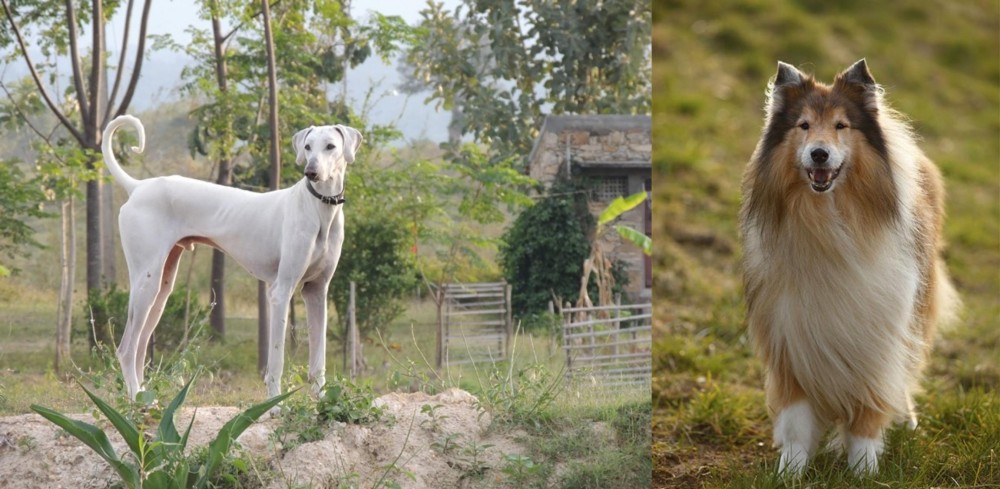 Chippiparai is originated from India but Collie is originated from United Kingdom. Both Chippiparai and Collie are having almost same height. Chippiparai may weigh 9 kg / 19 pounds lesser than Collie. Both Chippiparai and Collie has almost same life span. Chippiparai may have less litter size than Collie. Chippiparai requires Low Maintenance. But Collie requires Moderate Maintenance
Chippiparai is originated from India but Collie is originated from United Kingdom. Both Chippiparai and Collie are having almost same height. Chippiparai may weigh 9 kg / 19 pounds lesser than Collie. Both Chippiparai and Collie has almost same life span. Chippiparai may have less litter size than Collie. Chippiparai requires Low Maintenance. But Collie requires Moderate Maintenance
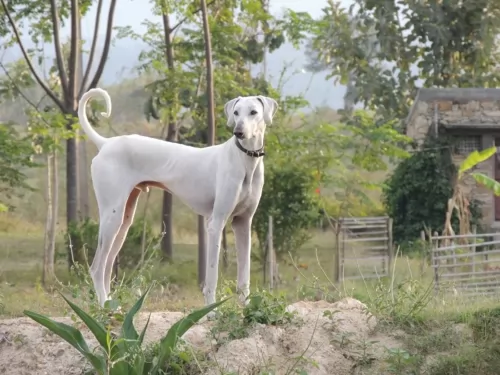 The Chippiparai is a working dog found in India and until recently there has been little interest in the purity of any breed, but rather only an emphasis on the abilities of the dog. They are only beginning to research the origin and history of their native dogs such as the Chippiparai. Not much is known about the origin of the breed except that it is found almost exclusively in Tamil Nadu and Keraia in the southern part of the subcontinent of India. Other than this there is much speculation about the breed’s origin but very little-known facts. It is indeed an ancient breed; however, its origin could be thousands of years ago or simply hundreds of years ago.
The Chippiparai is a working dog found in India and until recently there has been little interest in the purity of any breed, but rather only an emphasis on the abilities of the dog. They are only beginning to research the origin and history of their native dogs such as the Chippiparai. Not much is known about the origin of the breed except that it is found almost exclusively in Tamil Nadu and Keraia in the southern part of the subcontinent of India. Other than this there is much speculation about the breed’s origin but very little-known facts. It is indeed an ancient breed; however, its origin could be thousands of years ago or simply hundreds of years ago.
• Perhaps it is a descendant of the Saluki as it resembles this breed quite a bit. It has been believed for some time that the Saluki is the original sighthound and the source of all sighthound breeds. The Saluki was very popular in the Middle East, especially in Persia and Arabia from which it could easily have spread to India. It would then have been shared from Northern India to Southern India where the Chippiparai is found.
• Perhaps the Chippiparai is a descendent of sighthounds from Central Asia and Afghanistan – the Tazi, Taigan, Hortaya Borsaya or the Afghan Hound. This part of Central Asia had more trade, influence and contact with the Indian subcontinent early in their history than with any other region. The Chippiparai is considered by some to be more like these sighthounds than like the Saluki and the interaction between these regions has a much longer history than the Middle East and India.
• It is also speculated that the Chippiparai might have been developed completely and uniquely from the local street and working dogs. With the civilization of India being one of the oldest in the world, it is considered a possibility that the Chippiparai is the descendent of the Harappan hunting dogs that probably were developed by the Indus Valley or Harappa roiling class.
Wherever the Chippiparai came from, they were the exclusive property of the wealthy and ruling castes. These upper castes were the only ones that could legally hunt with dogs or afford to feed one. The royal classes of Tiruneivell, Thanjavur, and Madurai all fed the popularity of the breed among the upper castes. They were coursing dogs used to chase down the prey once it was sighted. The Chippiparai are incredibly fast runners and would catch almost any prey and either hold it or kill it for their hunter. The Chippiparai, when not hunting, had to be chained so they would not chase any small animal that they saw. This confinement also added to the purity of the breed as random breeding was prevented.
The southern part of the Indian subcontinent is extremely hot with routine temperatures over 100’. The Chippiparai was developed to withstand these extreme temperatures and is more heat tolerant than most any other breed. They also need very little food and are resistant to the many parasites and diseases found in southern India.
Harboring the belief that Indian dogs were not as good as European ones, the occupying countries of Portugal, France, and Britain, had no interest in the Chippiparai, again leaving the breed to develop naturally on their own with little or no interbreeding. They also received no formal recognition because Indian culture only valued the dog for its working abilities. There was no Indian Kennel Club until 1956.
The Chippiparai is now very rarely and only found in the area of its birth. Many believe the breed is in danger of becoming extinct and even though it is now registered with Indian Kennel Clubs it is not often shown in their dog shows. Lovers of the breed are now attempting to get Indians to recognize that the Chippiparai is a great companion animal and attempting to save the breed.
 The Collie is a herding dog from Scotland and is also known by other names such as Rough Collie or Lassie Collie.
The Collie is a herding dog from Scotland and is also known by other names such as Rough Collie or Lassie Collie.
The first Collies used to be more in size as today’s Border Collies and they were also essentially black. Queen Victoria stepped in to save the Collie from obscurity, bringing some back to England where their popularity soared.
The looks started changing as they were bred and in 1860 they were shown at a dog show in Birmingham, England as ‘Scotch Sheep Dogs’.Later on the sable coat color was introduced.
In 1879 the first Collie was imported to the United States and a club for the dog breed was formed in 1886.
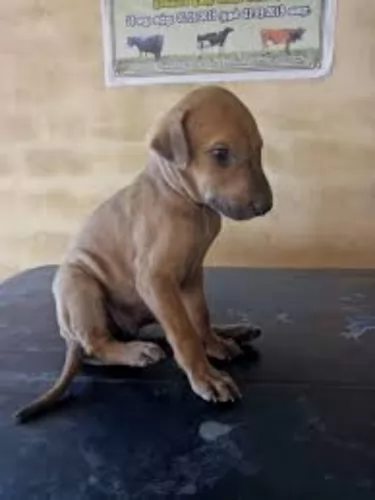 The Chippiparai is a typical sighthound although their size and appearance will vary more than that of registered purebred sighthounds. Typically, they will have a long, domed head with small erect ears and dark eyes. Their muzzle will be as deep and wide as the skull but longer. Their legs are straight and long, their chest is roached back and deep, giving them, an appearance very similar to a greyhound or other sighthound.
The Chippiparai is a typical sighthound although their size and appearance will vary more than that of registered purebred sighthounds. Typically, they will have a long, domed head with small erect ears and dark eyes. Their muzzle will be as deep and wide as the skull but longer. Their legs are straight and long, their chest is roached back and deep, giving them, an appearance very similar to a greyhound or other sighthound.
They have a long curly tail, and their coat can vary greatly in color. They are medium sized, and their coat is short, shiny and close. He is very slender and sleek, which along with his long legs gives him that incredible speed. They are thin with visible ribs.
 The modern Collie is a medium to large sized dog that stands at 51 – 61cm and weighs between 20 – 29kg. You could say that the popularity of the Collie grew because of the dog Lassie, a Rough Collie dog in the film ‘Lassie Come Home’. People who saw this film learned what a wonderful pet the dog could be.
The modern Collie is a medium to large sized dog that stands at 51 – 61cm and weighs between 20 – 29kg. You could say that the popularity of the Collie grew because of the dog Lassie, a Rough Collie dog in the film ‘Lassie Come Home’. People who saw this film learned what a wonderful pet the dog could be.
The Collie has two looks – the full coat which is known as the Rough Collie and the shorter coated Collie known as the Smooth variety. The coat comes in different colors but is essentially tri-colored in white, tan and black tips. The Collie has erect ears and a long, feathery tail.
Temperament of a dog is affected by a number of factors, including lifestyle of owners, heredity as well as whether the dog had training and socialization.
The Collie is a good-natured, friendly dog with no aggressiveness in him. He adapts well to city and country life, so long as he is with his human family, but he will need lots of exercise.
He will do well with training and socialization, turning into an even more splendid pet than he already is. He loves the children in the home and loves playing with them and watching over them. The Collie is intelligent and loyal and is easily trained.
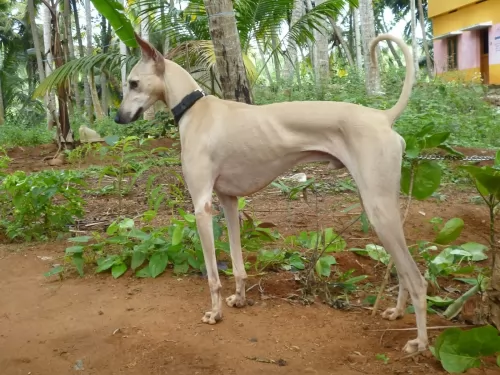 The Chippiparai is a loving, gentle family dog if well socialized, well trained and well exercised. They are very intelligent and need human companionship. Once they are living with a human family, they are very protective of that family. They are for the most part peaceful and quiet dogs. They are loyal and loving but they are not overly affectionate. Cuddlers they are not, and they do not like to play rough with children.
The Chippiparai is a loving, gentle family dog if well socialized, well trained and well exercised. They are very intelligent and need human companionship. Once they are living with a human family, they are very protective of that family. They are for the most part peaceful and quiet dogs. They are loyal and loving but they are not overly affectionate. Cuddlers they are not, and they do not like to play rough with children.
Accepting and loving within the family, the Chippiparai are equally hesitant and shy around strangers. They can be suspicious, but they are not aggressive. They are just very aloof with strangers, yet they hardly ever bark.
 Your Collie is an intelligent dog who will need physical exercise as well as mental stimulation too, otherwise he can develop some destructive behavior patterns that could be avoided just by seeing to his exercise needs.
Your Collie is an intelligent dog who will need physical exercise as well as mental stimulation too, otherwise he can develop some destructive behavior patterns that could be avoided just by seeing to his exercise needs.
He is easy to train and is a sensitive dog, wanting to learn and wanting to please.
A well trained Collie makes a wonderful pet. He is such a loyal dog that he will go to the ends of the earth for his owner, and guarantees to be every bit as affectionate, brave and loyal as the film-star dog, Lassie.
 There are no clinical studies regarding the health and health history of the Chippiparai, so little is known about their long-term health. However, most who know the breed, believe it is an incredibly healthy one. They seem to have a lot less genetically transmitted health issues than other purebreds. Because of their isolation for centuries in India, they have developed immunities and resistance to most parasites and diseases other dog suffer from.
There are no clinical studies regarding the health and health history of the Chippiparai, so little is known about their long-term health. However, most who know the breed, believe it is an incredibly healthy one. They seem to have a lot less genetically transmitted health issues than other purebreds. Because of their isolation for centuries in India, they have developed immunities and resistance to most parasites and diseases other dog suffer from.
Because of this you should look for the types of issues that occur in dogs of this size and build. Have them tested by the Canine Eye Registration Foundation and the Orthopedic Foundation for Animals.
 The Collie is a healthy dog breed generally, but just like with all other dogs, they are also prone to certain health conditions. It’s not to say that your Collie will get these diseases, but it can be beneficial to you and your pet’s health to be aware of them if you’re looking at the Collie as a pet.
The Collie is a healthy dog breed generally, but just like with all other dogs, they are also prone to certain health conditions. It’s not to say that your Collie will get these diseases, but it can be beneficial to you and your pet’s health to be aware of them if you’re looking at the Collie as a pet.
This is a condition where the skin of the nose peels and oozes and left untreated, it can be painful for your pet and could even lead to cancer.
This is an inherited eye disease that can actually lead to blindness. When certain parts of the eye don't develop properly it can lead to CEA - a genetic disease found in Collies as well as other dog breeds. The disease is also known as Choroidal Hypoplasia and brings about changes and abnormalities in the eye.
This is an abnormal formation of the hip socket and certainly dogs with hip dysplasia should never be bred as it can lead to pain and lameness.
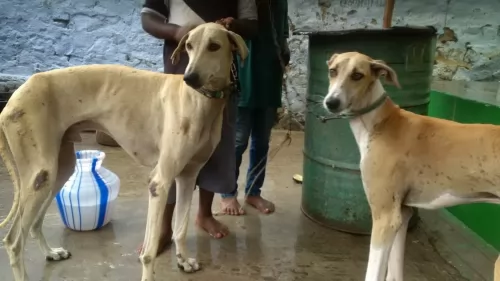 Do not overfeed your Chippiparai. Feed twice a day and no more than a total of 2.5 cups of high quality dry food.
Do not overfeed your Chippiparai. Feed twice a day and no more than a total of 2.5 cups of high quality dry food.
As mentioned previously the Chippiparai seems to have no genetic diseases or issues and very few acquired ones. However, he is sensitive to anesthesia and some foods. He is intolerant to cold weather and has a hard time with his pads on hard surfaces. Some Chippiparai might experience some of the ailments other breeds like them experience.
Both Elbow and hip are possible. This can cause arthritis and lameness. This occurs when the bone does not fit well into the joint.
This can cause lameness as well. The kneecaps slide over the knee instead of staying in place.
This is a hunting dog and he will want to hunt. They are incredibly fast and need the opportunity to run. Brisk walks will not be enough for this dog. He is very energetic. They will chase any small animals. It is not recommended that you have small pets even small dogs or cats with a Chippiparai. Having been bred for centuries to hunt, they are not likely to respond to any commands if they are off lease and chasing prey. Do not allow them to be off leash unless in a fenced area, and that fence needs to be 8 feet tall as they can easily jump a seven-foot fence. Try they at coursing, agility, fly ball and frisbee competitions.
 The Collie will need grooming because of his long hair, and you will need to brush it at least twice a week to rid it of loose hairs and to keep it free from tangles. This is especially important if you live in the country and he leads an active lifestyle running through fields.
The Collie will need grooming because of his long hair, and you will need to brush it at least twice a week to rid it of loose hairs and to keep it free from tangles. This is especially important if you live in the country and he leads an active lifestyle running through fields.
Keep a constant check on your Collie’s ears because dirt build-up can lead to an ear infection. Your vet can advise you on how to clean your dog’s ears. Make sure you have your Collie’s nails trimmed.
To cater for your Collie’s size and activity levels, make sure to feed him good food that meets his nutritional needs. Protein is the most important nutritional need for dogs, and apart from feeding your dog quality kibble, protein should also come from raw, animal-based sources such as meat, fish and poultry.
You can also include some cooked brown rice, vegetables and cooked chicken to provide variety. Make sure he always has fresh, cool water available.